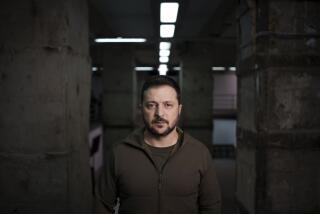Yeltsin Facing New Economic Jolt : Russia: A looming plunge in factory output is already forcing changes in his reform plan.
- Share via
MOSCOW — With the sting of huge price rises fading only now, Russia is heading for another jolt--a steep drop in factory output that should begin within 60 days. It already is forcing corrections in President Boris N. Yeltsin’s reform plan, the new economics minister said Monday.
But Andrei V. Nechayev’s announcement may lag behind events. Grim economic news from Russia has lost much of its shock value, as the world’s largest country struggles toward a market economy after seven decades of state socialism.
Still, one set of statistics this week is astonishing: In the former Soviet Union, industrial production has now reportedly fallen so far that in some sectors, it has almost reached pre-World War II levels.
Meanwhile, Yeltsin, who last month abolished the government controls that kept consumer prices artificially low, thereby triggering a quantum leap in the cost of living, changed his economic team.
He stripped Yegor T. Gaidar, his deputy prime minister, of direct responsibility over the economy, naming him finance minister. Nechayev, Gaidar’s friend and former top deputy, was named economics minister, while the state committee that had regulated Russia’s foreign trade was elevated in status to a ministry.
A separate decree split into two the “super ministry” of economy and finance that Gaidar had headed. Sources said that the idea had been Gaidar’s and that he was greatly overworked.
Nechayev, reviewing with reporters the first 40 days of the government’s reform efforts, said that prices in Russia are likely to increase by 100% more in the second quarter of 1992 but that not all of the economic news is bad.
This month, for example, prices have risen only about 10%, he said. But the aggregate leap in the cost of food and consumer goods since the government’s reforms took effect is enormous, he acknowledged. Prices as a whole soared 3 to 3 1/2 times last month when compared with last December; they were fully 1,000% to 1,200% above levels of January, 1991.
As it pursues a campaign to wean Russia from socialist state planning, the government is considering a plan to abolish controls on petroleum products by the end of April, letting prices zoom to market levels, Nechayev said.
A medium-grade gasoline now costs Russian motorists only about 5 rubles at the pump, or the equivalent of only 5 to 10 cents, depending on which exchange rate is used. But in many regions, gasoline is notoriously scarce and people will pay much more.
Within two months, Nechayev said, the Russian economy will start experiencing “a marked slump in production” that he blamed on the precipitous drop in buying power, and hence demand, of private citizens and enterprises.
Farm machinery, whose prices under Soviet rule were kept artificially low by a “mighty collective and state farm lobby,” Nechayev said, will be one of the first affected industrial sectors to experience drastically decreased demand.
Although committed to leading Russia on a forced march to a supply-and-demand economy, the government that Yeltsin heads as his own prime minister is now ready to prop up enterprises with taxation and financial privileges to prevent a “total collapse in production,” Nechayev said.
He defined such a collapse as a drop of 50% or more. That kind of collapse could lead to mass unemployment and widespread unrest in a country uneasy about the future.
Pressed about the likely social costs of the slump, Nechayev said it need not cause mass unemployment, since, instead of firing unneeded workers, factories will probably cut back on hours worked to trim their payroll.
Nechayev’s forecast, he admitted, is based on the continuation of the current “tough fiscal and credit policy,” which countless rank-and-file citizens now want scrapped. After miners in the Vorkuta region, above the Arctic Circle, won huge monthly wage hikes earlier this month from the Yeltsin team, other workers have been pressing Moscow for the same.
According to the television show Itogi (Results), overall industrial output in Russia and the other former Soviet republics declined by more than 17% in January, with output of railway freight cars and motorcars down 20% and tractors off 40% despite the imminent onset of spring planting.
Raw materials, the mainstay of Russia’s hard-currency exports, also suffered a setback, with output of coal dropping 10% and oil 12%, Itogi said. Its statistics were compiled by a professional group, the Russian Union of Industrialists and Entrepreneurs, and Itogi reported that some output levels were the worst since World War II.
There was more alarming news from the Russian State Committee on Statistics, which forecast a “significant reduction” of food production in the first quarter of 1992, including meat, dairy products, vegetable oil, sugar, noodles and baby food.
The trimly dressed, articulate Nechayev, who was able to reel off statistics to journalists’ questions with impressive ease, admitted the scale of the problems that remain, but he also pointed out some accomplishments over the past 40 days. For one, he said, “this extremely complex period passed without a strong social explosion.”
More to Read
Sign up for Essential California
The most important California stories and recommendations in your inbox every morning.
You may occasionally receive promotional content from the Los Angeles Times.













